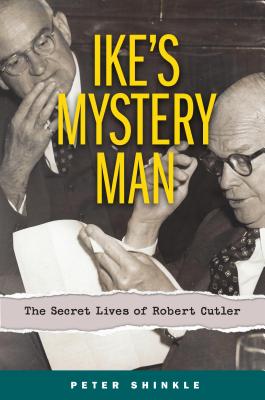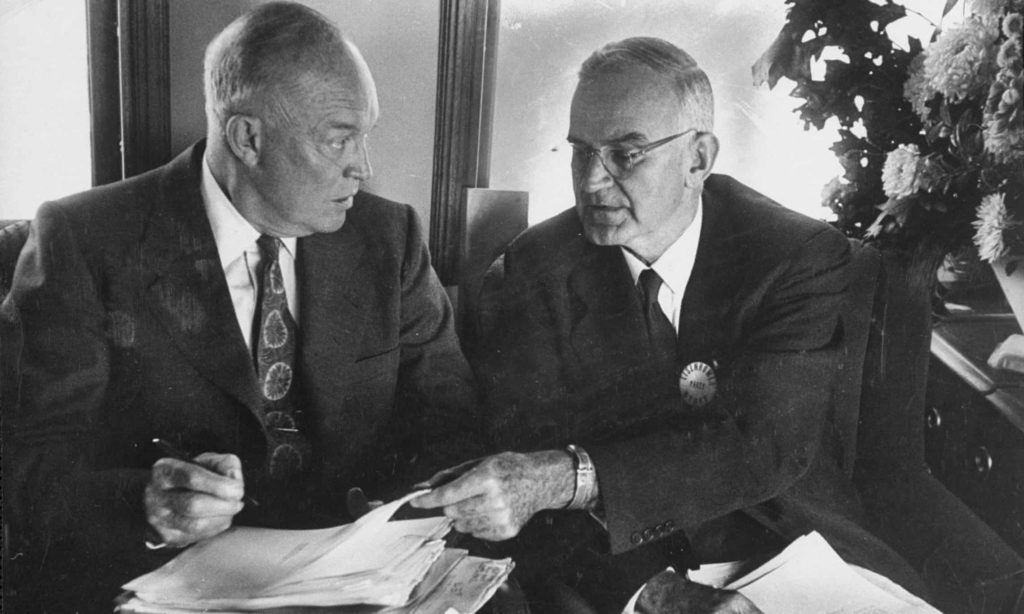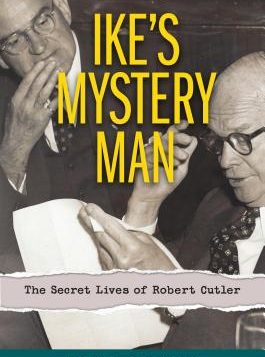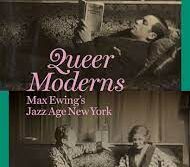 Ike’s Mystery Man: The Secret Lives of Robert Cutler
Ike’s Mystery Man: The Secret Lives of Robert Cutler
by Peter Shinkle
Steerforth Press. 416 pages, $29.95
Cutler, who was in his own words “born with a pen in his hand,” left a literary and artistic trail. He was a novelist (Louisburg Square, The Speckled Bird), an autobiographer (No Time for Rest), a poet, and a playwright (Beneath the Behind), as well as an actor and singer (usually in drag). He left behind a six-volume diary detailing his romantic obsession with that young man on his staff, whose name was Skip Koons.
Born in 1895, Cutler was the youngest of five brothers, all of whom graduated from Harvard. In his freshman year, he met Owen Wister, author of The Virginian, 35 years his senior and, in Cutler’s words, “eager and agreeable with younger men.” Wister became his mentor, and through him he met E. F. Benson, Henry Adams, Oliver Wendell Holmes, and Henry Cabot Lodge. Cutler served in World War I, graduated from Harvard Law School, helped Henry Cabot Lodge win a Senate seat and Maurice Tobin a second term as Boston’s mayor, served as Boston’s corporation counsel and in the War Department during World War II, and then returned to Boston as a bank president. In 1948, he met Eisenhower, who said Cutler “became a very close friend.” After campaigning together in the 1952 election, Ike asked Cutler to serve as his special assistant for national security.

Joseph Scherschel/The Life Picture Collection/Getty Images.
In the White House, Cutler brought order to national security decision-making with a “passion for anonymity.” Time magazine noted that “He probably carries more top secrets in his head than any other man in Washington.” His biggest secret was his homosexuality, which he did not hide from his family, close friends, and most likely Eisenhower. Cabot Lodge’s son Harry said he was so sure Cutler was gay that he came to look upon him as “an advance man for the gay movement.” And yet, it was upon Cutler’s recommendation that Eisenhower issued Executive Order 10450, which called for gay and lesbian employees to be discharged from government service. Eisenhower was aware that lesbians served on his staff as Commander of the Allied Forces in Europe, and while president of Columbia University he initiated a study concluding that homosexuals were wrongly dismissed from military service. Cutler had Eisenhower’s ear and probably could have “fixed” Executive Order 10540; but he did not.
At age 51, Cutler met Bill Sullivan, who was half his age and working at a Boston health club. In his own words, “like a lightning flash, [I] was attracted by his physical beauty.” He bought Sullivan an estate outside of Boston, where Sullivan and his wife raised their six children. “Uncle Cutler” visited regularly, Bill’s children recall, working with Bill and “taking cold baths.”
Cutler worked long hours at the White House, which may explain how his romantic obsession with Skip Koons began. He had recruited Koons, who was 31 years younger, with the assistance of one Steve Benedict, who had once been a lover of Koons’. Once settled in at the White House, they rented the historic home of Dr. Elisha C. Dick, who was George Washington’s physician, in Alexandria, Virginia. Cutler frequently visited the house in Koons’ Thunderbird convertible, but he never stayed overnight.
Cutler handled FBI matters for Ike, and Benedict served as the White House security officer. It appears that Cutler was never required to undergo a security clearance. Peter Shinkle found no disparaging records about Cutler, even though the latter resigned twice for “personal reasons.” After a second hiatus from the White House, Ike appointed Cutler to the board of the Inter-American Development Bank; Kennedy reappointed him in 1961. He survived in the White House because he was privileged, smart, resourceful, charming, and sexually innocent. Apparently he didn’t act upon his sexual feelings but only wrote about them, declaring at one point: “Yes, I am emotionally immature, as you say. And I thank God for it. For the alive freshness of early and penetrating feelings, rushing through me like a wild west wind, has done most to carry me forward in whatever levels my little life has attained.”
In retirement, Cutler was romantically involved with other young men, mostly at the hand-holding stage. He once confessed that he had had sex with only one man. He did not say which one. He suffered from dementia before dying at age 78 in 1974. Shinkle has painted an endearing and respectful portrait of his great uncle Bobby.





